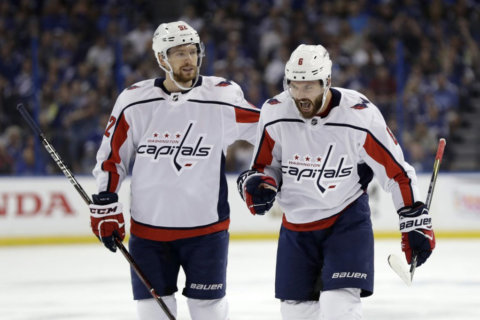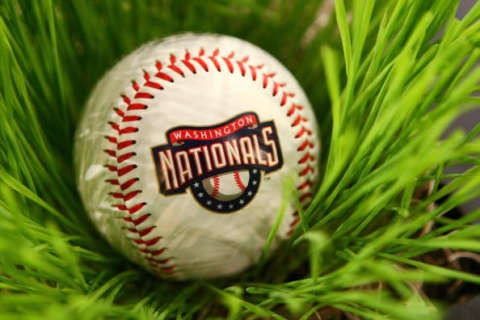WASHINGTON — Let’s be clear about something — as someone who didn’t grow up here, who has no emotional connection to the local teams, I would like to see the Caps to win it all. If any team does, they deserve to be the ones to break this growing D.C. sports curse, to raise the Stanley Cup and reward their fans for sticking with them through years of heartbreak.
But until the billionaires who own this city’s sports teams start accepting the bare minimum of their share of what it means to be civic leaders by paying for Metro to stay open so their fans can actually get home at the end of the night, they don’t deserve the satisfaction.
For those unfamiliar with the situation, here’s the deal. Metro’s last trains leave the Gallery Place station under Capital One Arena anywhere between 11:19 p.m. and 11:48 p.m. on weeknights, depending on which direction you’re headed. It costs $100,000 per hour to keep the system running beyond that time. This money has to be put in escrow ahead of time, but whoever pays for it gets paid back the full amount of fares that are used during the extra hour.
As Councilmember Jack Evans said when trying to secure the money to stay open after Thursday’s Game 4, nearly 6,700 people used the train to get home after Game 3, a number which could spike significantly if several thousand more end up watching on the big screen outside, as has been discussed. It would be wonderful to turn the area around Capital One Arena into an outdoor viewing party — fans who couldn’t afford a ticket, on the steps of the National Portrait Gallery, cheering the team on. But none of that is a reasonable thing to ask for without making sure they have a way to get home.
Even if the Caps make the Stanley Cup Finals and each series goes the distance, you’re talking about a maximum of four more additional home games, and if every one of them landed on a weeknight, a total of $400,000. That’s not chump change. But consider it against the profits that Monumental Sports & Entertainment would pull in for those games.
Fans pay exorbitant, hilariously inflated prices for tickets, food and drinks. They buy merchandise at insane profit margins. They show up, ready to stay as long as it takes to see their team to the end. And ownership won’t even step up to make sure that the fans who paid for it can get home at the end of the night, especially if the game stretches into overtime? How about for the hourly workers who staff the stadiums and arenas on mostly low-paying wages, the public faces of the organization, who serve the overpriced beer and hot dogs and jerseys with a smile?
What are we doing here?
What is the purpose of a professional sports team?
We’re sold on the idea that it is part of our civic duty to support our teams. We give them hundreds of millions of our tax dollars to build them arenas. Caps fans know only too well the emotional cost of fandom. But there’s a heavy monetary one, too.
In February, the Capitals announced that they would be raising some of their season ticket prices for the 10th time in 11 years. The cheapest tickets for the Eastern Conference Finals started at about $170 and went up from there. On Thursday morning, the get-in price on StubHub to Game 4 was $128 and the average ticket price was $336.
Meanwhile, the new Entertainment & Sports Arena on the St. Elizabeths Hospital campus — which will host Leonsis’ Washington Mystics, his new Capital City Go-Go G League team, and the Wizards’ practice facilities — will cost almost $70 million, nearly all of it taxpayer funded. The Nationals, meanwhile, play in an entirely publicly financed stadium that cost 10 times as much and still refuse to budge on Metro.
Say, what’s happened each of these two teams in each of their last two playoff home games when the teams haven’t ponied up the money to get their fans home?
The Caps have dropped Games 3 and 4 this week, wiping out their seeming stranglehold on the series. And the Nats lost do-or-die elimination Games 5 each of the last two years, with fans booing and forced to leave early.
Exelon stepped in to keep Metro open late for the Nats’ NLDS Game 5 last October, and did so again for the Caps’ Game 3. But for Game 4 Thursday night? It was Qatar. Yes, the country of Qatar.
So, let’s talk about Qatar. It was estimated late last year that over 1,200 immigrant workers brought in to build the stadiums for the 2022 World Cup had already died, and that 4,000 workers would die by the time the games actually take place in four years. That’s a higher death toll than September 11. From construction for a sporting event.
Qatar firmly believes in power of sports to bring people together in peace and friendship- our Embassy cherishes its role as a member of the DC community and we are pleased to partner with the Mayor, @DowntownDCBID and the Metro to get all Caps fans home safely tonight! #GoCaps https://t.co/mSrw32gFwD
— Meshal Hamad AlThani (@Amb_AlThani) May 17, 2018
Peace and friendship!
This is embarrassing. The transit system in our nation’s capital is being kept open by a country with an abysmal human rights record accused by its neighbors of funding terrorism.
Is Metro a disaster? Yes, of course it is, we all know this. But it’s what we’ve got, and when it’s not busy catching on fire, it’s moving more than 600,000 of us around the D.C. area every day to get us where we need to go. It’s in desperate need of repair and updating, a process which it is (very slowly) undergoing.
In the meantime, all it would take is an investment any reasonable person could conclude is a team owner’s civic duty to provide. It’s enough to make those who don’t (already) believe in karma. They’ve got more money than the average fan could ever dream of, but titles are the great equalizer. And this town’s owners don’t deserve any until they start treating the people who support them with a basic level of respect.






